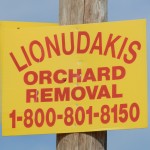
The latest refrain from the Valley pro-growth faction is that, “Farmland is increasing.” Drive east in Stanislaus County, and you’re likely to agree.
For mile after mile, orchards—mostly almond orchards—cover what was only a short time ago rocky pasture land. The orchards extend all the way onto and even over the rolling foothills that mark the first ascent into the majestic Sierra Nevada.
Seemingly a marvel springing from the famously fertile Valley soil, these orchards are actually more mirage than marvel. Talk to soil and water experts, and they shake their heads sadly at mention of orchards in the eastern part of the valley.
One such expert is Dr. Vance Kennedy. Kennedy is a retired hydrological engineer who formerly worked for the U.S. Geological Survey. He now farms a small plot north of Modesto, on soil he calls some of the best in the world.
In late March, Kennedy delivered a letter to the Modesto Irrigation District expressing his concern about the proliferation of orchards in eastern Stanislaus County foothills. According to Kennedy, orchards on the east side need more water than is available. At present, the orchards are surviving on groundwater. Kennedy estimates current depletion of ground water averages twenty feet a year or more. That means that in ten years, the groundwater will have dropped two-hundred feet or more. As the water table drops, pumping becomes ever more expensive. At some point, the orchard becomes a money loser.
But it’s not just the orchard’s owner who loses. Because there is no regulation of groundwater in California, groundwater use is a free-for-all. Given the lack of boundaries and regulations, overuse of groundwater always affects many more people than the principal user. In fact, over drafting of groundwater often results in what Vance Kennedy calls an “environmental disaster,” featuring bankruptcies, dead orchards, and a depleted aquifer that could take generations to replenish.
What the pro-growth people have been calling an increase in farmland is actually private exploitation of a public resource. Here’s what is happening in Kennedy’s own words:
“When the tree grower has removed the groundwater to 400 feet or so and lets his trees die, that property is useless for many decades. The water table will only be recharged by rainfall and that can raise the water table perhaps 5 feet per year. That almond grower has literally mined a valuable resource and harmed future generations. He has actually caused an environmental disaster, and as matters stand, there is no way of stopping him.”
In short, the seeming miracle of increasing farmland is yet another instance of mortgaging the Valley’s future for short-term gains, realized only by those shrewd enough to take their money and run.
In what is doubtless an unintentional irony, the most common signs along the roads of eastern Stanislaus County, aside from the usual road signs, are those advertising “Orchard Removal.” Given the likelihood that most of these orchards are on a one-way street to financial ruin, you have to wonder who will pay when it comes time to remove the dead wood.

great view on the east side water problem
more rules are needed
perhaps a water use tax
for large pumps
Mr. Caine,
Please note the recurrence of the term “mining”, this time used by Dr. Kennedy.
Residential development “mines” the value of good agricultural land that otherwise would produce repetitive crops, extracts the value of that land once (by building upon it), and leaves behind tailings that usually are toxic, in the form of the public infrastructure costs that exceed the tax revenues, and crime.
I appreciate your perceptive comment Mr. Reimer. Mining is an apt metaphor for many of our harmful practices, including but not limited to exploitation of land and rivers for short-term gain.